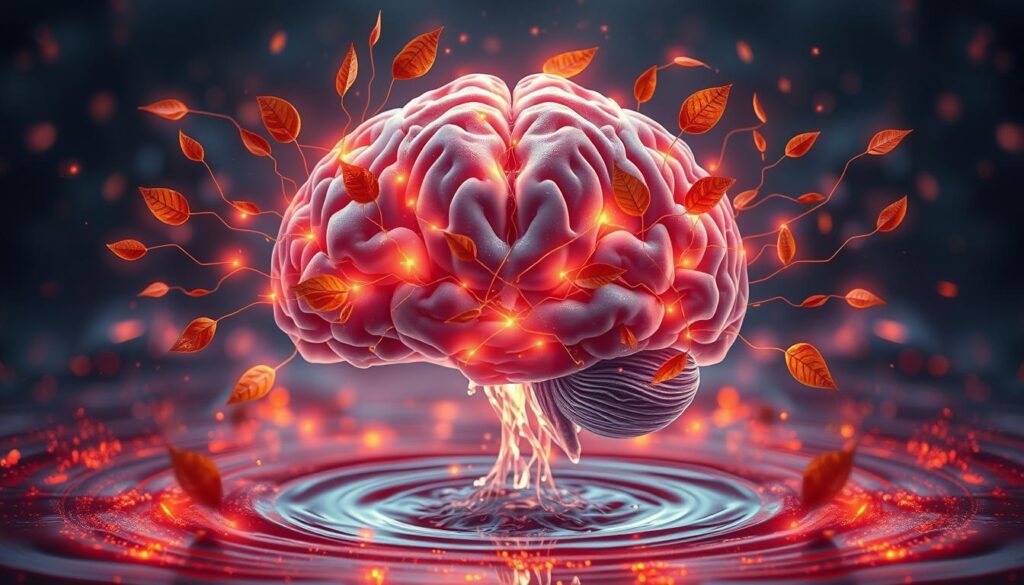“The present moment is the only time we have to be alive.” – Thích Nhất Hạnh, Vietnamese Buddhist monk and peace activist.
In today’s world, we face many distractions and stressors. Mindfulness and meditation offer a way to find peace and well-being. These practices help us stay present and aware, without getting overwhelmed. They also help us understand our minds better.
Scientists and healthcare experts have studied these practices. They’ve found out how they can improve our mental, physical, and emotional health. This knowledge is helping us live better lives.
Key Takeaways
- Mindfulness and meditation can reduce anxiety, depression, and boost immune function.
- Studies show mindfulness-based programs can change brain structure and function in as little as 8 weeks.
- Mindfulness-Based Stress Reduction (MBSR) has been effective in treating chronic pain and stress-related conditions.
- Mindfulness practice can enhance cognitive abilities, such as memory, attention, and self-awareness.
- Regular meditation has been linked to long-term brain health benefits, including protection against age-related cognitive decline.
Understanding the Fundamentals of Mindfulness and Meditation
Mindfulness is about being fully aware of the present moment. It means focusing on now, without thinking about the past or future. This practice can help reduce stress, improve focus, and boost overall well-being.
Defining Mindfulness in Modern Context
In today’s world, mindfulness is seen as a way of life. It helps us understand ourselves and our experiences better. We learn to watch our thoughts and feelings with kindness, not judgment.
The Core Elements of Meditation Practice
Meditation has two main parts: focused attention and open monitoring. Focused attention helps calm the mind by focusing on something like breathing. Open monitoring lets us be aware of everything around us without focusing on one thing.
Historical Development of Mindfulness Research
The study of mindfulness started in the 1970s. Dr. Herbert Benson at Harvard Medical School found the “Relaxation Response.” Jon Kabat-Zinn then created the Mindfulness-Based Stress Reduction (MBSR) program in the 1970s.
Now, research shows meditation improves mental and physical health. It can make life better, whether you’re new to it or have been practicing for a while. Adding mindfulness to your day can change your life for the better.

“Mindfulness is the basic human ability to be fully present, aware of where we are and what we’re doing, and not overly reactive or overwhelmed by what’s going on around us.” – Jon Kabat-Zinn
The Neuroscience Behind Mindfulness Practice
Mindfulness has a big impact on the brain, as studies show. These studies reveal how the mind, brain, and well-being are connected.
A study by Sara Lazar at Massachusetts General Hospital found something amazing. After an 8-week mindfulness course, the brain’s attention and sensory areas got thicker. This shows the brain’s neuroplasticity – its ability to change with mindfulness.
Richard Davidson and Jon Kabat-Zinn found that meditators’ brains show more activity on the left side. This is linked to happiness and well-being. Gaëlle Desbordes’ study also found changes in the amygdala, the emotional processing area, even when not meditating.
| Study | Findings |
|---|---|
| Fox et al. (2014) | Consistent differences in brain regions like the prefrontal cortex, somatomotor cortex, insula, hippocampus, anterior cingulate cortex, and orbitofrontal cortex between meditators and non-meditators. |
| Tang et al. (2015) | Mindfulness meditation increased activation in the anterior cingulate cortex and orbitofrontal cortex, areas linked to attention control and decision-making, while decreasing negative emotions and improving positive mood. |
| Luders, Cherbuin, and Kurth (2015) | Long-term meditators showed less age-related decline in gray matter volume compared to non-meditators. |
These findings from the neuroscience of mindfulness show that meditation can change the brain. This can improve thinking, feeling, and overall well-being. As research grows, we’ll learn more about mindfulness’s effects.

“The effects of mindfulness practice on neural structure and function need to be linked to cognitive, affective, and social functioning in future research.”
Mindfulness-Based Stress Reduction (MBSR): A Scientific Breakthrough
In 1979, Jon Kabat-Zinn created mindfulness-based stress reduction (MBSR). This 8-week program has shown great success in treating chronic pain, anxiety, and depression. It includes weekly group sessions, daily practice, and a retreat.
Development and Evolution of MBSR
MBSR started at the University of Massachusetts Medical School, led by Jon Kabat-Zinn. Over 40 years, it has become a leading method for dealing with daily stress. It’s now taught worldwide, recognized as the top mindfulness program.
Clinical Applications and Results
- Studies show MBSR can cut depression relapse rates by up to 50%.
- A large study found MBSR is safe, with no more harm than a waitlist control group.
- Community MBSR classes even showed they might protect against harm in many ways.
Integration with Modern Healthcare
MBSR has been welcomed in many healthcare settings. It has led to the creation of other mindfulness programs, like Mindfulness-Based Cognitive Therapy (MBCT). As mindfulness grows in science and popularity, MBSR is a key part of modern healthcare. It helps patients manage stress, improve mental health, and boost overall well-being.
“Mindfulness is essential for individual survival, community well-being, and species’ sustainability. It is a basic human inheritance.”
– Jon Kabat-Zinn, Founder of MBSR
The Science of Mindfulness and Meditation: Research and Evidence
The science backing mindfulness and meditation is growing fast. Mindfulness research shows these practices boost our health in many ways. They help our bodies, minds, and emotions, from boosting our immune system to easing anxiety and depression.
A big study looked at 47 research papers. It found that mindfulness meditation can help lower anxiety and depression. Sara Lazar’s work shows meditation can make our brains stronger in areas like attention. Mindfulness also boosts our immune system, with one study showing it increases flu antibodies after vaccination.
Mindfulness is now used in many places, like work and sports training. In the UK, about 30% of doctors send patients to mindfulness classes. A study in JAMA Internal Medicine found mindfulness improves sleep and reduces depression and fatigue after six weeks.
| Researcher | Notable Findings |
|---|---|
| Shauna L. Shapiro | Has published over 150 journal articles on the benefits of mindfulness. |
| Linda E. Carlson | Has published over 200 research papers and book chapters, and regularly presents her work at international conferences. |
While the benefits of mindfulness and meditation are clear, some experts want more research. They say we need bigger studies to fully understand how these practices help us.
“The more we understand the neuroscience behind mindfulness, the more we can harness its power to improve our lives and the lives of those around us.”
Neuroplasticity and Brain Changes Through Meditation
Meditation changes the brain in amazing ways, a process called neuroplasticity. Regular practice can rewire the brain, boosting thinking skills and brain health.
Structural Changes in the Brain
Long-term meditators show more gray matter in parts of the brain linked to learning and emotions. A study by Dr. Eileen Luders found their brains were better preserved with age. This suggests meditation might slow down brain aging.
Long-term Effects on Brain Function
Richard Davidson’s research shows meditation can change brain function for the better. It improves focus and emotional control. Mindfulness also boosts working memory, key for solving problems and understanding texts.
Age-Related Benefits for Brain Health
As we get older, our brains shrink, but meditation can slow this down. Studies link regular mindfulness to better memory and brain health. This means meditation could protect the brain as we age.
“Neuroplasticity is defined as the brain’s capacity to change in response to behavior. Mindfulness involves full attention to internal and external experiences in the present moment, and it induces structural changes in the brain linked to enhanced neuroplasticity.”
The science behind meditation’s power is still growing. It shows meditation can greatly improve brain function, emotional strength, and overall brain health.
Impact on Mental Health and Emotional Well-being
Mindfulness and meditation are powerful tools for better mental health and emotional well-being. Research shows they can be as good as antidepressants for treating depression and anxiety. Mindfulness-Based Cognitive Therapy (MBCT) even cuts down depression relapse rates by up to 50%.
Meditation also makes you more resilient to stress. It calms the amygdala and boosts connections between it and the prefrontal cortex. This helps you manage your emotions and handle stress better. Yet, some studies say meditation might not work better than other treatments like exercise or therapy.
“Mindfulness has been associated with increased subjective well-being. It has shown to reduce psychological symptoms and emotional reactivity.”
Mindfulness has its roots in Buddhism, a tradition over 2,550 years old. Since the 1970s, it has been used in Western medicine and psychology. Over 200 studies have looked at its benefits in reducing stress, anxiety, and depression.
Mindfulness-based interventions are great for preventing depression relapses. They also help with depression, pain, smoking, and addiction.
Adding mindfulness and meditation to your daily life can greatly improve your mental health and emotional well-being. It helps you become more aware of yourself and manage your emotions better. This way, you can face life’s challenges with more resilience and peace.
Physical Health Benefits of Regular Meditation Practice
Many studies show meditation’s big impact on physical health. It boosts the immune system and helps with chronic pain. Adding mindfulness to your day is a smart move.
Effects on Immune System Function
Meditation boosts the immune system. One study found meditators had more antibodies after a flu vaccine. It also lowers inflammation caused by stress, which is key for health.
Stress Response and Recovery
Meditation lowers cortisol, the stress hormone. This helps you recover faster and feel more balanced. Studies show it reduces stress markers, improving health and resilience.
Pain Management and Control
Meditation is great for chronic pain. It’s as good as some medicines for some people. It helps you understand and manage pain, improving life quality and reducing drug use.
| Benefit | Study Findings |
|---|---|
| Immune System Function | A randomized control trial (RCT) on 1,062 participants revealed a decrease in nuclear factor kappa b (Nf-kb) and C-reactive protein (CRP) levels due to meditation. |
| Stress Response and Recovery | Meditation has been associated with lower cortisol levels and faster recovery from stress, as demonstrated in various studies. |
| Pain Management and Control | Meditation has been found effective in managing chronic pain conditions, with studies showing it can be as effective as medication for some patients. |
Science backs up meditation’s benefits for physical health. It boosts the immune system and manages pain and stress. By making mindfulness a habit, you tap into your body’s healing power. This leads to a healthier, more balanced you.
Mindfulness in Relationships and Social Connections
In today’s fast-paced world, it’s easy to get caught up in daily life and forget about our personal relationships. But research shows that mindfulness can greatly improve our social connections. By being fully present and aware, we can understand and connect with others on a deeper level.
Studies show that mindful people handle conflicts better. They can control their emotions and respond with kindness. Mindfulness also boosts empathy and compassion, key for strong relationships.
A 2016 study found that mindfulness in parents’ brains improved parent-child relationships. This shows how mindful relationships can positively impact our closest connections.
Whether it’s a romantic relationship, family ties, or professional connections, mindful social connections are powerful. By being present, listening deeply, and communicating with compassion, we can understand others better. This leads to a more harmonious and fulfilling social life.
| Key Findings on Mindfulness and Relationships | Percentage |
|---|---|
| Mindfulness associated with higher happiness levels | 50% |
| Mindfulness linked to lower anxiety and depression symptoms | 34% and 44% respectively |
| Mindfulness correlated with greater purpose in life and behavioral activation | Significant positive associations |
| Mindfulness retreat attendance increased purpose in life | Significant increase |
As you deal with relationships and social interactions, remember the power of mindfulness. It can transform how we connect, empathize, and form deeper bonds with others.
“Mindfulness is not just about the individual; it’s also about our connections with others. When we’re fully present, we’re able to listen deeply, respond with compassion, and build stronger, more meaningful relationships.”
Integrating Mindfulness into Daily Routines
In today’s fast world, it’s easy to get lost in daily tasks without thinking. But, research shows that short mindfulness practices can make a big difference. They help us feel more present and connected to ourselves and our world.
One great way to add mindful living to your day is by making everyday tasks mindful. Studies say being present while eating or walking can make us happier and more satisfied with life. For instance, taking deep breaths before eating can make meals more enjoyable and help us eat better.
Mindfulness also works well in the workplace. It can lower stress levels and boost productivity. Starting the day with a short meditation or setting mindful goals can keep you focused and calm.
Sticking to practice is crucial for mindfulness benefits. The more you practice, the better you’ll feel. Even a few minutes of practical meditation techniques each day can change your life for the better.
| Mindfulness Practice | Benefits |
|---|---|
| Mindful Breathing | Reduces stress and anxiety, promotes relaxation |
| Body Scan Meditation | Increases self-awareness and emotional regulation |
| Mindful Walking | Enhances focus, attention, and physical well-being |
| Mindful Eating | Improves digestion, reduces emotional eating, promotes healthier habits |
By making daily mindfulness practice a part of your life, you can experience its amazing benefits. It can improve your well-being, sharpen your mind, and deepen your connection with the world.
“Mindfulness is the aware, balanced acceptance of the present experience. It isn’t more complicated than that. It is opening to or receiving the present moment, pleasant or unpleasant, just as it is, without either clinging to it or rejecting it.”- Sylvia Boorstein
Scientific Measurement of Meditation’s Effects
Scientists are using new methods to study mindfulness and meditation. Tools like functional magnetic resonance imaging (fMRI) and electroencephalography (EEG) help us see how meditation changes the brain. These methods show the deep effects of meditation on our minds.
Research Methodologies
fMRI and EEG are key in studying meditation. They help researchers see how meditation changes brain activity. These tools give us a peek into the mind, showing how meditation affects our thoughts, feelings, and health.
Current Studies and Future Directions
Studies are looking into how mindfulness helps with addiction and improves thinking in older people. They also explore how meditation boosts mental and physical health. Researchers want to know how long-term meditation changes our brains and how we see the world.
Limitations and Considerations
Even with growing evidence, there are still challenges in studying meditation. Many studies have small groups and lack control groups. Future research aims to standardize mindfulness and study its long-term effects, unlocking its full potential.
“The science behind mindfulness meditation has suffered from poor research designs and small effect sizes,” noted 15 psychologists and neuroscientists in a recent review.
As meditation research methods improve, we’ll learn more about mindfulness science. We’ll also understand the challenges and benefits of studying this complex practice.
Conclusion
Mindfulness and meditation have shown great promise for improving your mental and physical health. While more research is needed, the current studies support using these practices in healthcare and daily life. As studies go on, we’ll learn more about how to use mindfulness meditation best.
These practices can help in many ways, from boosting creativity and decision-making to strengthening your immune system. They can also help with sleep issues, depression, and high blood pressure. The future of mindfulness and meditation looks promising, with a chance to become a big part of healthcare and personal wellness.
Starting with just a few minutes each day, mindfulness and meditation offer simple, affordable ways to tackle health challenges. As scientists learn more, your journey to a healthier, happier life will become clearer and easier to follow.
FAQ
What is mindfulness and how is it different from meditation?
Mindfulness is being fully present and aware without getting overwhelmed. It’s about noticing the moment without judgment. Meditation, on the other hand, looks at the mind’s thoughts, feelings, and sensations.
What are the benefits of mindfulness and meditation?
Mindfulness and meditation can lower anxiety and depression. They also boost the immune system and help manage pain. Studies show they can change the brain in just 8 weeks.
How does meditation affect the brain?
Studies show meditation can change the brain’s structure and function. It increases thickness in areas for attention and processing. It also changes how the brain works, especially in the amygdala.
What is Mindfulness-Based Stress Reduction (MBSR) and how is it used?
MBSR is an 8-week program by Jon Kabat-Zinn. It includes weekly sessions, daily practice, and a retreat. It’s effective for chronic pain, anxiety, and depression, making it a standard treatment.
What does the research say about the long-term effects of meditation?
Long-term meditators have more gray matter in areas for learning and emotions. Meditation may also protect against cognitive decline with age.
How effective is mindfulness-based therapy compared to other treatments?
Mindfulness meditation is as good as antidepressants for depression and anxiety. Mindfulness-Based Cognitive Therapy (MBCT) can cut depression relapse rates by up to 50%.
What are the physical health benefits of meditation?
Meditation boosts the immune system and reduces stress inflammation. It’s effective for chronic pain and lowers cortisol levels. Regular practice helps recover faster from stress.
How can mindfulness improve relationships and social connections?
Mindfulness makes relationships better by improving communication and empathy. It helps people recover faster from conflicts.
How much mindfulness practice is needed to see benefits?
Even short daily practices can help. But regular practice is essential for lasting benefits. Studies link practice time to positive outcomes.
What are some of the current limitations and future directions of mindfulness research?
Current research faces small sample sizes and variability in techniques. Future studies aim to standardize mindfulness and explore long-term effects.




























































